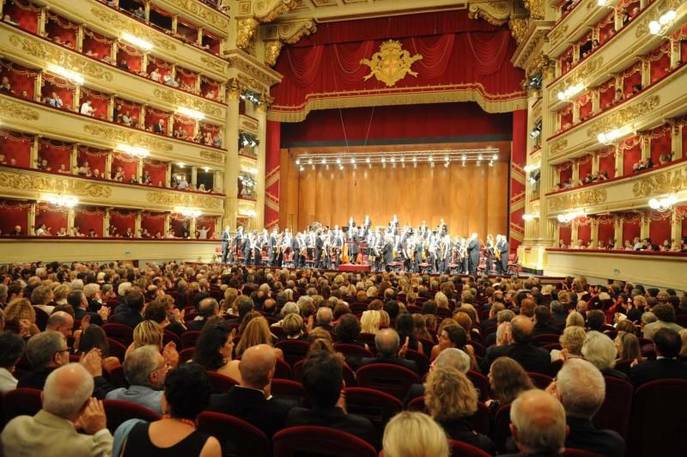


Opera is the grandest of art forms. Part of the thrill of attending a performance is to sit in a glorious theater built just for that purpose, knowing that the greatest voices of the past and present have been heard there. The most important of these theaters—in Milan, Vienna, London, Paris, Barcelona, and New York—have a distinctive character and history that has profoundly affected the evolution of opera.
Opera expert Fred Plotkin* examines these fabled houses, focusing on what makes each of them unique and significant. Using audio and video recordings and illustrations, he evokes the glamour and fascination that surround them, the cities that built them, and the legendary artists who performed on their stages.
JAN 22 Teatro alla Scala, Milan [2]
If any opera house is first among equals, it is the magical La Scala. It is every singer’s dream toappear there and every opera lover’s dream to hear a performance there. Other theaters may be more attractive or more opulent, and today there are other venues where performances of equal quality can be heard. Yet La Scala is far and away the most important theater in Italy, the nation that invented opera. More works that are part of the world’s standard repertory had their premieres here than anywhere else, and the singers, directors, and conductors who have been part of La Scala’s legendary productions are a roster of opera’s greatest.
FEB 12 The Vienna State Opera [3]
Only the Wiener Staatsoper, as it is called in the Austrian capital, can claim to compete with La Scala’s status. This is because no city in the world is more intensely connected to classical music (and, by extension, opera) than Vienna. Operas by Mozart, Beethoven and Strauss had their premieres in Vienna, and the city has always had a strong Italian presence, making it a musical crossroads between the Italian and German opera worlds. It is a theater full of traditions and superstitions, and one that has had many golden ages, one of the most notable when it was run by the brilliant and formidable Gustav Mahler.
MAR 19 The Royal Opera House, Covent Garden, London [4]
Although it began as a place to present entertainments of all sort, the theater at Covent Garden quickly evolved into a venue for opera in part because of the early-18th-century arrival in London of George Frideric Handel, the greatest opera composer of his time. During his years of living there, the city took its place with Naples as Europe’s two most important centers of opera. Though the Royal Opera House experienced a rough patch at the end of the last century, many international observers now think that under the dynamic artistic leadership of Antonio Pappano it offers the consistently highest level of opera of any theater, nourishing a generation of British and international talent that is dominating the world’s stages.
The flamboyantly gorgeous Palais Garnier is the theater that inevitably springs to mind when you think of opera in Paris, a city that was the opera capital of the world in the 19th century. Every French composer of the day made his name in Paris and the city, with its theaters and conservatories, was an incubator of native-born talent such as Berlioz, Gounod, and Bizet. This remarkable structure occupies a place of honor on the Right Bank, and is a hub from which grand boulevards radiate. The Opéra Garnier became the most important social gathering place in post-royal Paris, and created the gold standard for stage technology that would not be surpassed until well into the 20th century.
MAY 21 Gran Teatre Liceu, Barcelona [6]
Unlike many of the most important opera houses, Barcelona’s is not a building designed to be admired from across a square. Rather, it’s found along Las Ramblas, the Catalan capital’s liveliest thoroughfare, just steps away from the Boqueria, one of the most amazing food markets in the world. Its roots in urban life give remarkable animation and buzz to the experience of attending a performance here. The city is the birthplace of several legendary opera artists, including Victoria de los Angeles, Montserrat Caballé, and Jose Carreras, and the discerning Liceu audience accords a great deal of love to the finest singers who appear at Teatre Liceu. That’s why top stars make a point of appearing at the historic opera house as often as they can.
JUN 18 The Metropolitan Opera, New York [7]
America’s leading opera company performs in its best opera house, the legendary Met. In fact, there have been two of them, the 1883 Old Met and the New Met that replaced it in 1966. Everything done there, onstage and off, is fodder for the intensely passionate and opinionated New Yorkers who are its core audience. The Met—old and new—has been a pioneer in technology and outreach, with its worldwide radio broadcasts, live television performances, and since 2006, screenings of productions seen by millions in movie theaters around the globe. What is often overlooked is that the Met is a place of real beauty, with paintings by Marc Chagall, gold ceilings, Austrian crystal chandeliers, and beautiful African rosewood, whose resonance gives this auditorium of nearly 4000 seats perhaps the best acoustics of any major opera house.
LOCATION: [8]
S. Dillon Ripley Center [9]
1100 Jefferson Drive, SW
Metro: Smithsonian [10] Mall Exit (Blue/Orange)
* Fred Plotkin, author of Opera 101: A Complete Guide to Learning and Loving Opera, lectures for the Metropolitan Opera Guild and the New York Philharmonic.
Source URL: http://test.casaitaliananyu.org/magazine/events/reports/article/worlds-greatest-opera-houses-fred-ploktin
Links
[1] http://test.casaitaliananyu.org/files/teatro-scala-milano-1223051420787183jpg
[2] https://smithsonianassociates.org/ticketing/tickets/reserve.aspx?performanceNumber=230253
[3] https://smithsonianassociates.org/ticketing/tickets/reserve.aspx?performanceNumber=230254
[4] https://smithsonianassociates.org/ticketing/tickets/reserve.aspx?performanceNumber=230255
[5] https://smithsonianassociates.org/ticketing/tickets/reserve.aspx?performanceNumber=230256
[6] https://smithsonianassociates.org/ticketing/tickets/reserve.aspx?performanceNumber=230257
[7] https://smithsonianassociates.org/ticketing/tickets/reserve.aspx?performanceNumber=230258
[8] https://smithsonianassociates.org/ticketing/help/event-logistics.aspx#venues
[9] https://smithsonianassociates.org/ticketing/help/locations/ripley.htm
[10] https://smithsonianassociates.org/ticketing/subscriptions/series/detail.aspx?series=175272